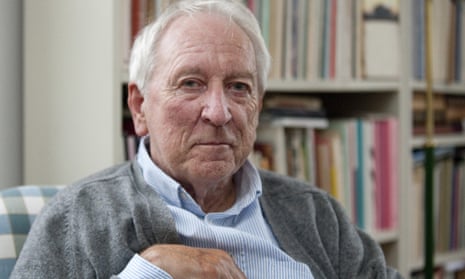The Swedish poet Tomas Tranströmer, who won the Nobel prize for literature in 2011, died in Stockholm on Thursday at the age of 83. He had lost the power of speech after a stroke in 1990, but continued to write poetry, and to play the piano with his left hand.
For most of his life, he worked part-time as an industrial psychologist and the rest of the time as a poet.
His sparse output was highly praised from the moment his first collection, 17 Poems, appeared in 1954 and he was acknowledged as Sweden’s greatest living poet long before he won the Nobel. He was translated into more than 60 languages.
He wrote in exceptionally pure, cold Swedish without frills. His descriptions of nature were as sparse and alive as a Japanese painting. In fact, in later life, he attempted to write haiku in Swedish. Peter Englund, the secretary of the Swedish Academy, said: “One of the secrets of his success around the world is that he’s writing about everyday stuff. The economy of words that you can see in his poems is manifested in the economy of his output; you can get the core of his work in a pocket book of 220 pages. You can get through it in an evening.”
Björn Wiman, writing in the Stockholm paper Dagens Nyheter, praised him for his capacity to transform the everyday into astonishment. “His poem C Major is almost unique in the history of literature, since it both describes and summons up pure delight.”
The Guardian praised him when he won the prize as “unobtrusively unforgettable”, a writer “whose style is so simple as to make most words seem vain and superfluous. In translation, some of the slippery hard simplicities of his lyricism can melt like ice. But enough remains to show a poet who transforms the ordinary in apparently ordinary language. The world he sees is sometimes bleak or terrible, but it is always also full of promise no less real for being inexpressible: ‘The only thing I want to say glints out of reach, like silver in a pawnbroker’s’.”
Despite his work as a psychiatrist, Tranströmer’s writings about the mind never bore any hint of medicalisation. Within the hard classical forms there was an unquenchable romantic flame. He was alive to movement, and to change. A cabbage white butterfly might in his poetry become “a fluttering corner of truth itself”.
“Every abstract picture of the world is as impossible as a blueprint of a storm”, he also wrote. Perhaps that is why his work seemed to heighten reality so much. The longer time goes on, the further it gets from eternity. Only the moment approaches timelessness.
Per Wästberg, another member of the Swedish Academy, and a childhood friend of the poet’s, wrote in Svenska Dagbladet that “his poems open doors, give you vertigo, and at the same time offer a still calm: this is how things are and you can’t put them otherwise”.
Tranströmer was a socialist, a humanist and an atheist, and he managed to make life seem much more delicious: “Don’t be ashamed because you’re human,” he wrote once. “Be proud! Inside you, vaults behind vaults open endlessly. You will never be finished, and that’s as it should be.”

Comments (…)
Sign in or create your Guardian account to join the discussion